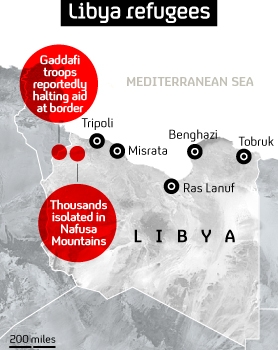Libya: Mountain villagers facing ‘starvation’
Channel 4 News speaks to a source in Libya who tells of the potential starvation of thousands in the Nafusa Mountain range due to Gaddafi forces blocking aid, medicine and water.
The western Nafusa Mountains of Libya, which run along the breadth of half the country to the Tunisian border and are home for hundreds of thousands of people, are dangerously cut off from aid and essential basic supplies, threatening a serious humanitarian crisis that has been getting a lot less attention than the situation in the beseiged port city of Misrata.
An anonymous source told Channel 4 News that the situation in the area has developed to a point where Libyan women, children and the elderly are suffering from potential starvation. As well as the growing difficulty in transporting supplies of food and water around the conflict-stricken country, it is being reported that Gaddafi troops are targeting aid lines to force rebels out of the mountain region that is the home of tribes that have long been anti-Gaddafi.
Read more: Misrata killings 'may be war crimes'

Channel 4 News spoke to a Libyan contact in the west of the country who has been helping to smuggle essential produce into the country: “The people are totally cut off in the mountains, very little medical equipment is getting up there. There are 16-18 villages being attacked by daily raids in tanks, some reports of shooting indiscriminately at houses and anything that moves, as well as historical monuments. It is chaos, shelling on a daily basis, ground missiles, rocket launchers.”
In addition there have been reports that systematic shelling has been unleashed so close to the border that one Tunisian border guard has been killed and three others injured:
“They (the Libyan forces) have cut off water communications and we are having to smuggle in baby supplies. If it carries on for another few days to a week water will run out, innocent men women and children, elderly and disabled will die of starvation.
Nafusa Mountains – Key strategic position
The mountain area is seen as a key strategic position for the future of the conflict and although nearly all the settlements are relatively small they act as a barrier between Tripoli and much of the rest of the country. It is also believed that control of this area could ensure Gaddafi a safe route out of the country if he needs to leave.
Since the beginning of the rebel uprising the range has been controlled by the opposition. In the last week reports have come from the region that Gaddafi troops have upped their attacks in the area with speculation that missiles have even been shot as far as 30 miles inside the Tunisian border.
The Berber tribe, who live predominantly in the mountainous region, have been strong opponents of the Gaddafi regime throughout his 42 year rule. Almost as soon as protests began in Libya, the towns and villages up and down the range declared that they were firmly part of the rebellion. A Channel 4 News source in the region accused Colonel Gaddafi of using the conflict to “cleanse” the region of the Berber people.
On April 16 NATO launched one of their first attacks in the area on Gaddafi forces near Zintan. As well as the 17,000 (estimated) refugees who fled across the border into Tunisia at the beginning of the conflict, it is believed a further 6,000 have crossed over where the mountain range meets Tunisia at the village of Wazin.
The UN World Food Programme (WFP) announced on Tuesday that they have successfully established a “life saving humanitarian route to populations caught in violence in Western Libya” via the Tunisian border.
Greg Barrow from the WFP told Channel 4 News the extent of the aid demands caused by the situation in Libya: “I think you’ve got to take on board the fact that Libya is not self sufficient, it needs to import it’s food, have movement of food supplies along open routes and this conflict has impacted on this in a serious way.”